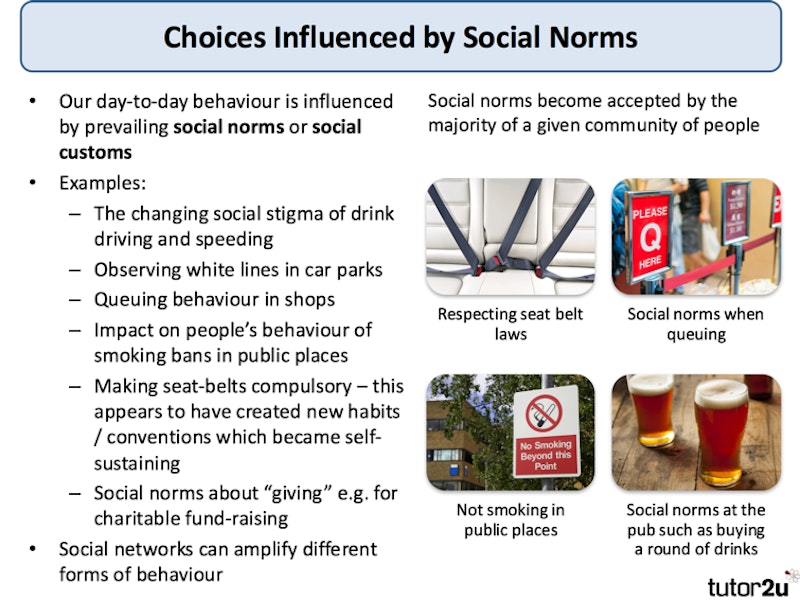Study Notes
Social Norms and Human Behaviour (Behavioural Economics)
- Level:
- AS, A-Level, IB
- Board:
- AQA, Edexcel, OCR, IB, Eduqas, WJEC
Last updated 21 Mar 2021
What are social norms?
Our day-to-day behaviour is influenced strongly by what we understand to be the prevailing social norms or social customs. Social norms become accepted by the majority of a given community of people.
Examples of social norms
- The changing social stigma of drink driving and speeding / driving safely including observing speed limits
- Observing white lines in car parks
- Queuing behaviour in shops
- Social norms about how much effort we put in at work
- Impact on people’s behaviour of smoking bans in public places
- Making seat-belts compulsory – this appears to have created new habits / conventions which became self-sustaining
- Social norms about “giving” e.g. for charitable fund-raising
- Social norms around paying taxes
- Corruption may become an engrained social norm in different societies
Social norms can and do change! One example is the trend decline in smoking in the UK. In 2016, of all adult survey respondents in the UK, 15.8% smoked which equates to around 7.6 million in the population. Less than 10 percent of young adults are reported in surveys to be regular smokers.

Individuals are not calculating automatons. Rather, people are malleable and emotional actors whose decision making is influenced by contextual cues, local social networks and social norms, and shared mental models.
It is important to understand that most of the decisions we take are hugely contextual. Social network effects can amplify different types of behaviour (both good and bad). Influencing or nudging people to "think socially" may prompt significant behavioural change.
Individuals are social animals who are influenced by social preferences, social networks, social identities, and social norms
You might also like

Nudging to Achieve Behavioural Change
11th June 2015

Germ Theory and Behavioural Nudges for Better Health
6th November 2016

Nudges in the Bar - Choice Architecture and Drinking Less
31st December 2016

How to Get People to Always Reply to Your Emails
14th April 2017
Behavioural Economics - Key Cognitive Biases
Topic Videos
Daily Email Updates
Subscribe to our daily digest and get the day’s content delivered fresh to your inbox every morning at 7am.
Signup for emails